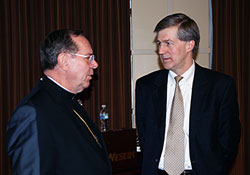Professor offers insight to lawmakers on moral tax policy

Archbishop Daniel M. Buechlein shares a moment with University of Notre Dame Law School Professor Matthew J. Barrett. Barrett was the keynote speaker at the Indiana Catholic Conference’s annual legislator luncheon on Jan. 16.
(Photo by Charles Schisla)
By Brigid Curtis Ayer
Each year, the Indiana Catholic Conference hosts a legislator luncheon
and brings an expert from the Catholic
community to Indianapolis to help try and form the hearts and minds of state lawmakers on a pressing public policy issue facing the state.
This year’s expert, University of Notre Dame Law School Professor Matthew J. Barrett, was given the task of enlightening legislators on effective yet morally acceptable ways they could deal with the looming issue of property tax reform.
It is the goal of the Indiana General Assembly to reduce or eliminate property taxes this year.
Currently, property taxes fund a wide range of state and local programs that support the common good. They fund public schools, police and fire protection, and a safety net for the poor.
When taking into account this broad range of programs, it is generally acknowledged that a reduction or elimination of property taxes would need to be made up in other ways for those programs to continue at their current funding level.
To address this concern of the Church, Barrett provided legislators with a “macro” perspective of forming morally and fiscally sound taxation rather than a single approach to property tax reform.
“Render unto Caesar in Indiana and Catholic Social Teaching on Taxation,”
the title of Barrett’s talk on Jan. 16, covered basic concepts in Scripture and Church teaching which recognize the role of
government and the obligation that people
have to pay taxes.
More importantly, his presentation stressed the words in Luke’s Gospel that “much will be required of the person entrusted with much” (Lk 12:48).
Barrett began his talk by saying, “I come to you because of my faith and 25 years of experience. … I come on behalf of the poor.”
Quoting from the United States Conference of Catholic Bishops’ 1986 pastoral letter, “Economic Justice for All: Pastoral Letter
on Catholic Social Teaching and the U.S. Economy,” Barrett said that in order to accomplish basic economic justice, the U.S. bishops refer to “a system of taxation based on assessment according to ability to pay” as a “prime necessity.”
The 1986 pastoral letter uses three principles to evaluate the U.S. tax system, saying it should: 1) raise adequate revenues to pay for society’s needs, especially the basic needs of the poor; 2) use a progressive structure so that those with greater resources pay a higher tax rate; and 3) not require families living below the poverty level to pay income taxes.
The Iowa Catholic bishops in 2003 issued a statement on taxation which Barrett said could be used as a guide for Indiana.
“Catholic moral teaching raises two essential questions that apply to all economic policies including tax policy,” Barrett said.
“First, does this policy maintain or enhance the life and dignity of the human person? And secondly, how does this policy affect the poorest and the most vulnerable of our brothers and sisters?”
Barrett explained that Catholic teaching offers two basic principles which should govern tax policy—contributive and distributive justice.
Contributive justice requires everyone to contribute based on their ability to pay. Distributive justice requires that wealth be allocated in such a way to ensure that the basic material needs of people are met.
In evaluating Indiana’s current tax system, Barrett told lawmakers he gave them “a passing grade” on the contributive justice aspect since everyone contributes to sales taxes, income taxes and all homeowners pay property taxes.
However, he pointed out that on the issue of ability to pay, while the poor do receive some tax breaks, “the state does not ask the rest of us—the non-poor, the blessed—to pay progressively more.”
Barrett challenged legislators to adopt tax policies that were “both in fact and in appearance” more progressive. He recommended progressive income tax rates, increases in standard deductions and personal exemptions; progressive local option taxes rather than a flat tax; exemptions from sales tax for residential utilities and school supplies; and a variable homestead exemption that decreases as the assessed value increases.
In his closing remarks, Barrett said that Speaker of the House B. Patrick Bauer
(D-South Bend) was quoted recently in
The South Bend Tribune on this year’s
property tax reform outcome, saying that “he hoped there were more winners than losers.”
Barrett said he would offer a friendly addition to Rep. Bauer’s comments: “If the poor win, we all win.”
Reacting to Barrett’s presentation, Rep. Bauer said, “I applaud Professor Barrett’s work and the ICC for bringing
him here for this legislator luncheon. The presentation offered a realistic approach to tax reform.
“His suggestion to include sales exemptions for the poor is something we actually did in 1973,” Rep. Bauer said. “We exempted food and medicine from sales tax.
“Increasing certain standard deductions, giving utility exemptions for the poor and giving sales tax exemptions, I advocate all of the above. … ”
(Brigid Curtis Ayer is a correspondent for The Criterion.)†
